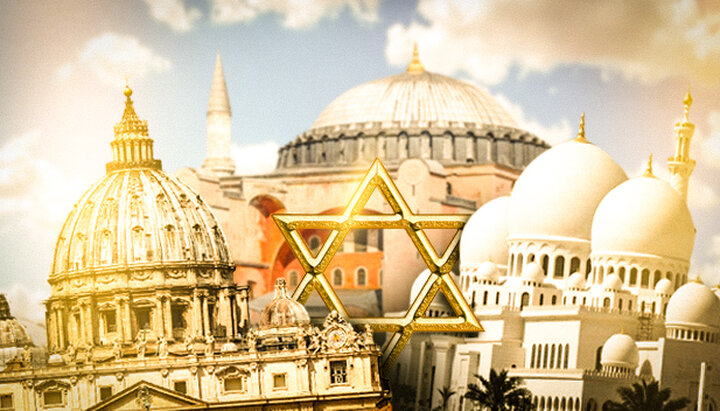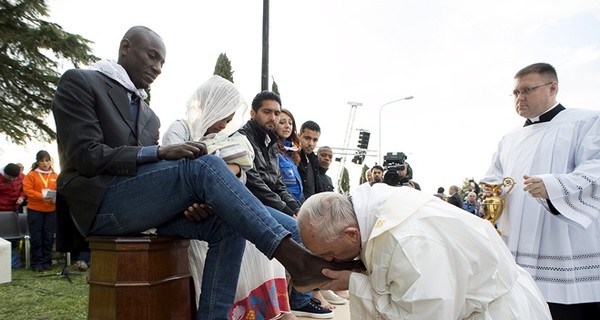Phanar begins dialogue with Islam and Judaism: what is it like?

The Phanar begins a dialogue with Jews and Muslims, Catholics have been engaged in such dialogue for a long time. What can it lead to and what should we know about it?
On November 1, 2021, Patriarch Bartholomew, while on a visit to the United States, announced the beginning of a dialogue with Jews and Muslims. “The Church of Constantinople, in parallel with its leading participation in the ecumenical movement, has also begun an official dialogue with other religious traditions, especially with two other monotheistic religions, Judaism and Islam,” said the head of the Phanar. The Vatican has been conducting a similar dialogue for a very long time, and its results are very interesting. We analyze how it might be interesting for us.
As a prologue
Before starting to analyze the dialogue the Vatican is having with Islam and Judaism, it is advisable to look at what the BLM (Black Lives Matter) ideology is. The reader will understand from the text that follows why we draw such parallels. In the meantime, we simply state that, according to this ideology, the descendants of white people, who have oppressed and inflicted immense suffering on the black for centuries (the black caused each other no less suffering, but it is not accepted to focus on this now), today must pay and repent before the descendants of the black. They should cry, kneel in front of them and kiss their feet. By the way, Pope Francis does just that, albeit nominally for a different reason.

The white also must pay them subsidies, grant them greater rights, turn a blind eye to their crimes today, etc. And the blacks should accept all this condescendingly and force the white to repent and pay even more.
Judeo-Catholic dialogue
In most publications, this dialogue is called Judeo-Christian, but it is more correct to call it Judeo-Catholic since it is the Vatican who conducts it, and the consequences of this dialogue so far extend only to Catholicism.
The dialogue itself in its current form began after World War II and the mass extermination of Jews called the Holocaust. As a result of these events, the so-called "Christian theology after Auschwitz" arose in Catholic theological studies. In a very simplified way, it boils down to the fact that the Holocaust became the pinnacle of the suffering of the Jewish people to which Christians have subjected them for two thousand years. The responsibility for all this lies with Christians, who must “pay and repent” and change their beliefs in a way that does not hurt the feelings of the Jews. One of the researchers of this topic S. Lezov writes:
"In today's Christian <...> theology, it is mainly not the moral and political responsibility of Christians for the genocide of Jews that is discussed: now the direct guilt of Christians is beyond doubt, moreover, its public recognition is increasingly becoming an element of good form." Orthodox Rabbi Solomon Norman of the Centre for Jewish Studies in Oxford wrote that Hitler inherited his attitude towards Jews from Christianity: “In essence, Hitler's attitude towards Jews is no different from Christianity; the difference lies only in the methods that he used.” Heinz-Peter Katlewski, in his article "Theology after Auschwitz", published in 2005 by Deutsche Welle, states: "The precondition for the Holocaust was the persecution that Christians had subjected Jews to for 2,000 years."
Orthodox Rabbi Solomon Norman of the Centre for Jewish Studies in Oxford wrote that Hitler inherited his attitude towards Jews from Christianity.
"Theology after Auschwitz" from the Catholic side developed as "theology of reconciliation", i.e. recognition by Catholics of their responsibility or at least their co-responsibility for the Holocaust, and accordingly – atonement. But from the Jewish side, things were different. The ideological foundation of the Judeo-Catholic dialogue was laid by the Jewish historian and writer Jules Isaac (1877-1963), who lived in France. In his books “Jesus and Israel” (1946) and “The Genesis of Anti-Semitism” (1956), the relationship of Christianity to Judaism is viewed as the "teaching of contempt". The apostles, evangelists, Holy Fathers of the Church are characterized by him as consistent anti-Semites who hated the Jewish people. According to Jules Isaac, they should also share the moral responsibility to the Jews for Auschwitz and the Holocaust. This “teaching of contempt” is to be replaced by the “teaching of cleansing,” within which Christians should do the following:
- exclude from their liturgical texts, especially those read on Good Friday, any mention of the crimes of the Jews;
- declare that the Jews are not responsible for the death of Christ, except along with the rest of humanity;
- exclude from the Gospel texts references to the actions of the Jews against Christ, and especially the following passage from the Gospel of Matthew: “And answering, all the people said: His blood be on us and on our children” (Matt. 27:25);
- to recognize that the Church for two millennia has incited enmity and hatred towards the Jews;
- bring repentance to the Jews for this and make all necessary efforts to eliminate the evil that it brought them.
After the Christian teaching is “cleansed”, it must be transformed into a “doctrine of respect,” that is, recognize Judaism as your elder brother and not try to convince Jews of the need to believe in Christ as the Son of God. “You are our elder brothers,” Pope John Paul II addressed the rabbis when he visited the Roman synagogue in 1986.
“You are our elder brothers,” Pope John Paul II addressed the rabbis when he visited the Roman synagogue in 1986.
A very powerful impetus in the development of Judeo-Catholic dialogue was the Second Vatican Council (1965) and the “Declaration on the Relationship of the Church to Non-Christian Religions” (Nostra Aetate) adopted there, in which a significant part was devoted to Judaism. The document contained several statements that fundamentally change the attitude of Catholicism towards both Judaism and the evangelical events.
Firstly, this document does not distinguish between Old Testament Judaism and the so-called Judaism after the Temple, which arose after the destruction of the Second Temple by the Romans in 70 AD. Secondly, the non-trihypostatic Jehovah (deliberately incorrect vocalization of the Name of God), which is worshipped by modern Jews, is recognized as the true God. Thirdly, the Jewish people are recognized as innocent of the crucifixion of the Savior: “Although the Jewish authorities and their adherents insisted on the death of Christ, however, what was done during His passions cannot be indiscriminately imputed to the guilt of either all Jews living then or modern Jews." Here it is already very clear that the guilt of the Jews, who shouted: "Crucify, crucify Him!" is not imputed to anyone else except themselves, while the fault of the German fascists who killed Jews in Auschwitz falls on all Christians in general. And fourthly, it is practically recognized that the Jews do not need Christ for salvation, they in any case remain the chosen people of God: “The Jews, for the most part, did not accept the Gospel, and many of them even opposed its spread. Nevertheless, according to the Apostle, for the sake of their fathers, the Jews are still dear to God, whose gifts and calling are immutable."
The provisions of the Nostra Aetate Declaration, and even more so the further documents adopted by Catholics on its basis, are nothing more than the implementation of Jules Isaac's programme for the transition of Christianity (Catholicism) from the "teaching of contempt" to the "teaching of respect". This is how it was perceived in the Jewish community. World Jewish Congress member Jean Halperin wrote about the Nostra Aetate declaration that it "really opened the way for an entirely new dialogue and initiated a new view of the Catholic Church on Jews and Judaism, demonstrating its willingness to replace the teaching of contempt with the teaching of respect."
In 1973, in furtherance of the provisions of Nostra Aetate, the Conference of Catholic Bishops of France adopted the “Declaration on the Relationship of Christians to Judaism", which, among other things, said that it "categorically condemns the accusation of deicide against the Jews". That is, the Catholic bishops recognized that the Jews, who killed the historical Jesus Christ by the hands of Roman soldiers, did not kill God. This is how the Jews themselves understand it.
Jewish scholar Helen Fry, commenting on the Nostra Aetate declaration in the book "Christian-Jewish Dialogue", wrote: "In 1965 the Catholic Church dropped the charge of ‘deicide’ against the Jews: it was previously believed that by committing the murder of Jesus, the Jews killed God himself." It is easy to see that this statement is tantamount to denying the God-manhood of Jesus Christ, denying the Symbol of Faith, which says: “I believe in the only Lord Jesus Christ, the Son of God, the only begotten of the Father born before all ages, Light from Light, true God from true God < ...> Crucified for us under Pontius Pilate ... ". It is very significant that in 1986, when Pope John Paul II visited the main synagogue of Rome, he made a speech in which Jesus Christ was mentioned only once and was named as "the son of your (Jewish - Ed.) people" and was not named Son of God.
Catholics today believe that modern Judaism and Christianity are two paths that lead to the same goal.
Catholics today believe that modern Judaism and Christianity are two paths that lead to the same goal. In 2018, the German Catholic monthly edition “Herder Korrespondenz” published a letter from the retired Pope Benedict XVI, in which he stated that Judaism and Christianity are two forms of interpreting the Holy Scripture and that Jews do not need to preach Christ. “Missionary work among the Jews is neither foreseen nor necessary. Christ sent His disciples to proclaim the Good News to all nations and cultures. Therefore, the missionary commission is universal, but with one exception: among the Jews it is neither foreseen nor necessary for the reason that only they alone among all other nations knew the ‘unknown God’." In the opinion of Benedict XVI, in dialogue with Jews, it is necessary to talk about "understanding the personality of Jesus of Nazareth".
All these deviations of Catholics from the very essence of Christianity can be commented with the words of the Holy Apostle John the Theologian: “This is how you can recognize the Spirit of God: Every spirit that acknowledges that Jesus Christ has come in the flesh is from God, 3 but every spirit that does not acknowledge Jesus is not from God. This is the spirit of the antichrist, which you have heard is coming and even now is already in the world” (1 John 4: 2,3).
As you can see, the Catholics fully satisfied the wishes of the opposite side in the Judeo-Catholic dialogue, and what did they get in return? By and large, only that the Jews agreed to recognize the merits of Jesus Christ in popularizing Judaism among non-Jews, and then with the proviso that they themselves do not need Him. Helen Fry, who was already mentioned above, an active participant in the Judeo-Catholic dialogue, writes about it this way: “Judaism can do just fine without Jesus: there is a rich Jewish rabbinic tradition that developed parallel to Christianity and testifies to the possibility of a different, non-Christian use of the biblical heritage ... But at the same time, the Jews can accept and do accept Jesus as the person through whom the Gentiles recognized the God of Israel.”
Christian-Islamic Dialogue
It is much more difficult to characterize the dialogue between Christians and Muslims for the reason that Christians communicate much more with Muslims at the social and everyday level than with Jews. In many countries, they are closely adjacent to each other and are simply forced to conduct a dialogue with each other. The difficulties of such a dialogue include the lack of centralized governance in Islam. If Catholicism is a single administrative structure with its centre in the Vatican, then Islam is represented by many independent movements, each of which can have its own view of both Christianity and dialogue with it.
However, as far as the theological dialogue is concerned, it, like the Judeo-Christian dialogue, is conducted mainly between Muslims and Catholics. And within the framework of this dialogue, the founding documents are both the Nostra Aetate declaration adopted at the Second Vatican Council (1965) and the Lumen Gentium Declaration adopted in the same place, Paragraph 16 of which says: "But the plan of salvation also includes those who acknowledge the Creator. In the first place amongst these, there are the Muslims, who, professing to hold the faith of Abraham, along with us adore the one and merciful God, who on the last day will judge mankind." We can say that with regard to Islam, the Second Vatican Council radically changed its medieval tradition, according to which Islam was recognized as heresy, and the founder of the Muslim religion, Muhammad, was a false prophet and even the Antichrist. Now, as Pope John Paul II said in 1985, addressing Muslims: "Our God and yours are one and the same, and we are brothers and sisters in the faith of Abraham."
Pope John Paul II said in 1985 addressing Muslims: "Our God and yours are one and the same, and we are brothers and sisters in the faith of Abraham."
However, this change applies not only to Islam but also to all non-Christian religions in general. If before the Second Vatican Council, the Catholic Church recognized all those who did not belong to it as the heirs of hell, now this attitude is completely different. Paragraph 2 of Nostra Aetate says: “The Catholic Church rejects nothing that is true and holy in these religions. She regards with sincere reverence those ways of conduct and of life, those precepts and teachings which, though differing in many aspects from the ones she holds and sets forth, nonetheless often reflect a ray of that Truth which enlightens all men."
In 2019, during a visit to the United Arab Emirates, Pope Francis and the Supreme Imam of Al-Azhar Sheikh Ahmed El-Tayeb signed a joint “Document on Human Fraternity for World Peace and Living Together”, the main message of which was to establish interfaith tolerance and peaceful coexistence. One of the paragraphs of this document reads: “We call upon intellectuals, philosophers, religious figures, artists, media professionals and men and women of culture in every part of the world, to rediscover the values of peace, justice, goodness, beauty, human fraternity and coexistence in order to confirm the importance of these values as anchors of salvation for all and to promote them everywhere." That is, the Roman pontiff, positioning himself as the vicar of Christ on earth, signed under the words that the "anchor of salvation" is anything but the Lord Jesus Christ.
Soon after Pope Francis's trip to the UAE, a project was presented to build a temple complex for three Abrahamic religions: Christianity, Judaism and Islam.

It should be said that in dialogue with Muslims, the Vatican did not allow such deviations from its own faith as in dialogue with Jews. But this is due to the fact that Islam arose at the beginning of the 7th century when the Christian doctrine was already largely formed. In addition, the Muslims from the very beginning recognized Jesus Christ as a prophet and gave Him, as well as his Most Pure Mother, an appropriate veneration. Conflicts between Muslims with the Christian world were mainly not theological but military-political and manifested themselves in the form of conquests or colonization. Therefore, the Catholic-Muslim dialogue is mainly focused on peaceful coexistence and the prevention of wars and terrorism.
Conclusions
Firstly, the words of Patriarch Bartholomew that "the Church of Constantinople <...> has begun an official dialogue <...> with two other monotheistic religions, Judaism and Islam" testify to the Phanar's intention to enter this dialogue at a qualitatively new level, with new goals and objectives, after all, such dialogues themselves have been going on for quite a long time and within the framework of the work of various ecumenical structures.
Secondly, since the entry of the Phanar into the dialogue occurs simultaneously with the intensification of the unification process with the Vatican, this means the Phanar’s joining the dialogue that the Vatican has been conducting for several decades.
Thirdly, the experience of Catholics testifies that within the framework of such a dialogue, the Vatican deviates from its doctrine to please its partners in the dialogue. This is especially true of the Judeo-Catholic dialogue. However, there are practically no reciprocal steps.
Fourthly, there is no reason to believe that the Phanar, within the framework of this dialogue, will not follow the path of apostasy and will remain faithful to the primordial Orthodox teaching.
And fifthly, today there is no longer any doubt about which path the Patriarchate of Constantinople is going. Follow him or remain faithful to Orthodoxy – this is the question now facing every Local Orthodox Church. And each Church must answer it itself.











